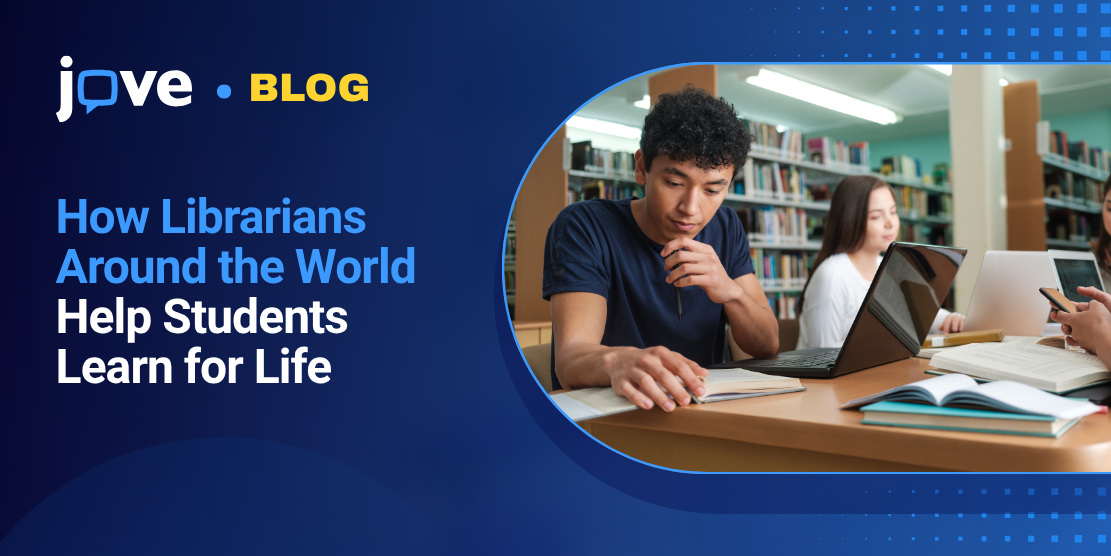Learning is not limited to a single period of life.
It develops in stages, and libraries are often the places that guide people from one stage to the next. In recent JoVE webinar sessions, librarians from India, Kenya, and the United States described how they work with students, faculty, and their wider communities. Their experiences offer a clear view of the skills and practices academic librarians use to guide learners through university and beyond.
Below are key ideas from these sessions and how they connect to the work librarians do every day.
Facilitating Learning at Many Stages
Libraries first reach people through early reading activities in childhood, then support teens who need safe learning spaces, and later guide adults who return to study. Everlyn Anduvare (Karatina University, Kenya) described how her library works with local schools, provides child-friendly reading areas, and offers digital literacy programs for teens and community members.
These early experiences matter because they shape how students arrive at university. Some enter with strong reading habits, while others need support in understanding sources, searching for information, or using technology. Academic librarians help bridge these differences so that students can succeed in their first semester and beyond.
Helping New Students Adjust
Many students reach university with limited experience using academic sources. They may know how to search the web, but not how to evaluate journals, methods, or research tools. Everlyn noted that librarians help new students build “strong research skills from the start” by teaching them how to source, compare, and use reliable information.
At North Carolina State University, Kristy Borda sees similar needs. Students often arrive confident with technology but unsure how to judge information quality. She highlighted that “students do not feel adequately prepared for an AI-enabled workplace” and that librarians now address this gap through instruction and guidance.
Academic librarians give students the structure they need at this early stage of university learning. Clear explanations, simple terminology, and patient guidance help students understand what academic work requires.
Supporting More Advanced Research
As learners move deeper into their studies, their questions become more complex. They shift from finding information to understanding why and how it matters.
Librarians help them navigate this transition by:
- 💡 Explaining differences between study types and research methods
- 💡 Showing how to trace evidence across articles
- 💡 Guiding them in evaluating the reliability of tools, including AI
- 💡 Helping them connect concepts across classes and disciplines
This support often involves close collaborations with faculty. Librarians join classes, lead workshops, and offer one-to-one consultations for projects and theses. These activities strengthen research skills and help students build confidence.
Libraries as Community Anchors
Our speakers emphasized that academic libraries do not work in isolation. They often support groups outside the university, including schools, educators, and local communities. These partnerships help everyone involved.
At Karatina University, for example, the library works with schools to improve reading culture and information skills. They also offer digital literacy sessions for adults, including farmers and small business owners. These programs help people gain new skills that support education, employment, and daily life.
Academic libraries benefit from these partnerships too. When schools strengthen early skills, universities welcome students who are better prepared for academic research. Strong community ties also show that libraries are central to regional learning, not just campus learning.
Here’s an example from a recent JoVE Lunch & Learn, where librarians met to share ideas, discuss common challenges, and exchange practical strategies for supporting the academic community.
The Librarian’s Role Across All Stages of Learning
Across regions, librarians described a common theme: learning changes, and librarians adapt.
1. Guiding Information Use
Librarians help learners understand how information is created, organized, and used. This includes explaining academic integrity, ethical use of tools, and verification of results. Kristy stressed that librarians are not promoting or rejecting new tools but “educating about them” so students can make informed decisions.
2. Creating Welcoming Spaces
Modern learners need different environments. Some prefer quiet study, while others rely on group work, multimedia rooms, or flexible seating. Librarians design and manage spaces that support these choices.
3. Learning Continuously
Every speaker discussed the need for constant upskilling. Librarians are learning new tools, understanding new policies, and responding to new learning behaviors. This ongoing development helps libraries stay relevant as learning needs evolve.
Tools That Support Lifelong Learning
Libraries work best when they offer a mix of formats and approaches. Visual, textual, and interactive tools each support different stages of understanding. JoVE’s video resources help students visualize scientific concepts, lab techniques, and research methods, making it easier for them to follow complex material. These videos also support faculty who teach diverse student groups with different levels of preparation.
Because JoVE integrates with LMS platforms and includes built-in quizzes, it also fits naturally into teaching workflows. This gives librarians a useful starting point when working with faculty to design learning support.
Moving Forward
Lifelong learning is a shared journey. Libraries help people grow from their first encounters with reading to advanced academic research. As the speakers in our webinars showed, librarians guide these transitions with patience, expertise, and a clear understanding of how people learn.

